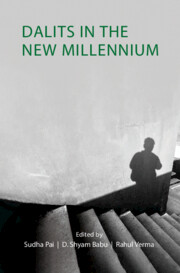Book contents
- Frontmatter
- Contents
- List of Figures
- List of Tables
- Acknowledgements
- 1 Introduction: Dalit Discourse in the New Millennium
- Part I Shifting Patterns of Electoral Politics
- Part II Popular Culture, Discourse, and Protest
- Part III Transformations in Ideology and Identity
- Part IV Aspirations and Anxieties
- Part V Discrimination and Representation
- 20 Do Scheduled Caste Reservations for Political Office Improve the Lives of Dalits?
- 21 Are Dalit Legislators Performing Their Oversight Role? Evidence from the Question Hour in the Lok Sabha and Select State Legislatures
- 22 Why Are Some Backward Castes Demanding Scheduled Caste Reservation?
- 23 Measuring Caste-Based Discrimination
- 24 Dalit Suicides in India
- About the Contributors
- Index
21 - Are Dalit Legislators Performing Their Oversight Role? Evidence from the Question Hour in the Lok Sabha and Select State Legislatures
from Part V - Discrimination and Representation
Published online by Cambridge University Press: 12 July 2023
- Frontmatter
- Contents
- List of Figures
- List of Tables
- Acknowledgements
- 1 Introduction: Dalit Discourse in the New Millennium
- Part I Shifting Patterns of Electoral Politics
- Part II Popular Culture, Discourse, and Protest
- Part III Transformations in Ideology and Identity
- Part IV Aspirations and Anxieties
- Part V Discrimination and Representation
- 20 Do Scheduled Caste Reservations for Political Office Improve the Lives of Dalits?
- 21 Are Dalit Legislators Performing Their Oversight Role? Evidence from the Question Hour in the Lok Sabha and Select State Legislatures
- 22 Why Are Some Backward Castes Demanding Scheduled Caste Reservation?
- 23 Measuring Caste-Based Discrimination
- 24 Dalit Suicides in India
- About the Contributors
- Index
Summary
After independence, India opted for quota-based reservation for Dalits and Adivasis (Scheduled Castes [SCs] and Scheduled Tribes [STs]) in the national and state legislatures. The need for such representation arose from the idea that universally defined rights of political citizenship are insufficient to guarantee representation of ascriptively defined social groups. Scholars such as Will Kymlicka (1995), Anne Phillips (1995), Melissa Williams (2000), and Niraja Gopal Jayal (2006: 6) support group representation within the institutions of representative democracy, which promise formal equality but, in reality, systematically under-represent the historically marginalized.
The original goal of reservation was to bring the SCs, or Dalits, into the mainstream (Jensenius, 2015). However, much of the research that studied the performance of Dalit legislators has focused on their role as representatives of their community and whether they were effective in developing their community. The majority of such studies found political reservation to have almost no effect on the condition of Dalits (Galanter, 1979; Dushkin, 1972; McMillan, 2005; Yadav, 2008; Jensenius, 2012, 2015). Aimee Chin and Nishith Prakash's (2011) study found no significant impact of reserved seats in reducing poverty among the SCs but reported a better positive correlation between reserved seats and reduction of poverty among the STs. Only Rohini Pande's (2003) study showed that political reservation had increased redistribution of resources in favour of groups which benefitted from such reservation. However, she also argued that existing political institutions could not enforce full policy commitment. Simon Chauchard and Francesca Jensenius in this volume (see Chapter 20) provide a review of the empirical research on the impact of political reservation on the SC community in India. The present chapter begins with a brief history of political reservation in India.
A Brief History of Political Reservation in India
As the British started opening up legislative bodies to Indians during the colonial period, the oppression of ‘untouchables’ became a prominent social and political matter. By 1919, religious minorities in India (Muslims, Sikhs, Indian Christians, and Europeans) were politically represented through separate electorates. B. R. Ambedkar, an erudite, foreign-educated economist, took up cudgels on behalf of his community and started arguing for universal adult franchise and political representation for untouchables on the basis of their proportion in the population.
- Type
- Chapter
- Information
- Dalits in the New Millennium , pp. 374 - 393Publisher: Cambridge University PressPrint publication year: 2023



